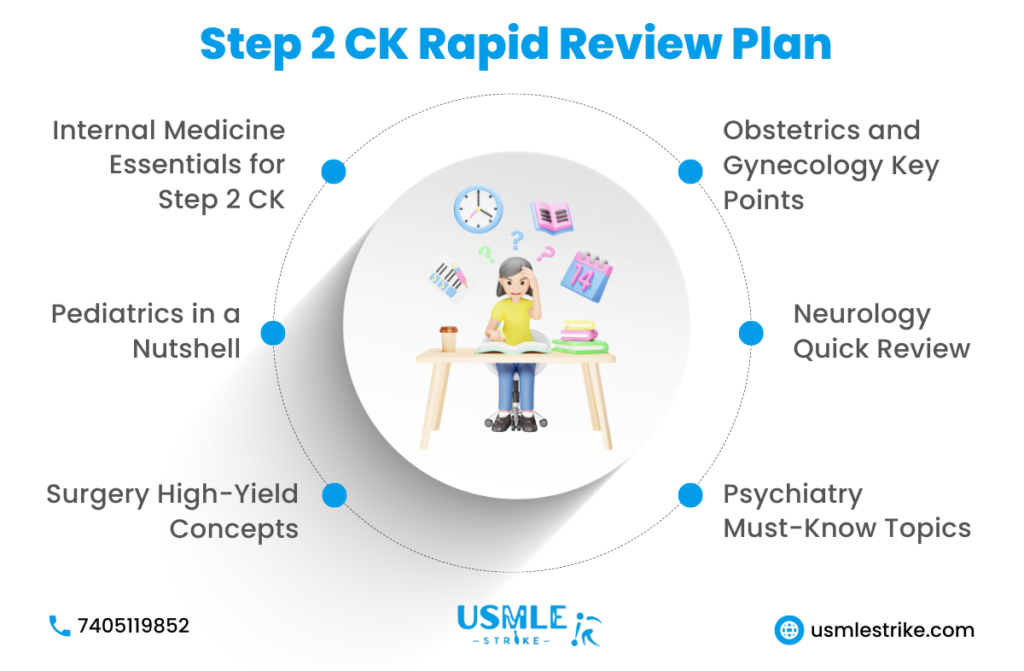The United States Medical Licensing Examination (USMLE) Step 2 Clinical Knowledge (CK) is a pivotal exam that medical students and graduates must pass to become licensed physicians in the United States. A “Step 2 CK rapid review” offers a focused approach to revisiting high-yield topics and sharpening test-taking strategies, making it an essential component of effective exam preparation.
Understanding the USMLE Step 2 CK
The Step 2 CK assesses an examinee’s ability to apply medical knowledge and clinical science for patient care, emphasizing health promotion and disease prevention. A “Step 2 CK rapid review” enhances preparation by focusing on high-yield topics and core competencies, ensuring efficient recall and application of knowledge, critical for transitioning into unsupervised medical practice.
Exam Structure and Content
The Step 2 CK exam continues to evaluate candidates’ ability to apply medical knowledge and clinical science in patient care, with a strong emphasis on health promotion and disease prevention. The exam is structured into eight 60-minute blocks completed in a 9-hour session. While the number of questions per block can vary, it won’t exceed 40, ensuring a comprehensive assessment within a manageable timeframe.
Importance of Rapid Review for USMLE Step 2 CK
The importance of a Rapid Review for USMLE Step 2 CK cannot be overstated, especially as the exam date approaches.

High-Yield Topics for USMLE Step 2 CK
USMLE Step 2 CK Rapid Review is a resource that can help you enhance your clerkship studying, master content with questions, and optimize test-taking strategies. It includes:
Internal Medicine
- Cardiology: Acute coronary syndromes, heart failure, arrhythmias.
- Pulmonology: COPD, asthma, pneumonia, tuberculosis.
- Gastroenterology: Peptic ulcer disease, inflammatory bowel disease, hepatitis, cirrhosis.
- Nephrology: Acute kidney injury, chronic kidney disease, electrolyte imbalances.
- Endocrinology: Diabetes mellitus, thyroid disorders, adrenal disorders.
- Hematology/Oncology: Anemia, coagulation disorders, common cancers.
- Infectious Disease: HIV/AIDS, sexually transmitted infections, common bacterial and viral infections.
Surgery
- General Surgery: Appendicitis, gallbladder disease, hernias.
- Trauma: Management of blunt and penetrating trauma.
- Orthopedics: Fractures, joint disorders.
- Vascular Surgery: Aneurysms, peripheral vascular disease.
Pediatrics
- Growth and development milestones.
- Vaccinations and preventive medicine.
- Common pediatric diseases (e.g., acute otitis media, asthma, congenital heart defects).
Obstetrics and Gynecology
- Pregnancy management, including high-risk pregnancy.
- Labor and delivery.
- Gynecologic disorders, such as pelvic inflammatory disease and endometriosis.
Psychiatry
- Mood disorders, anxiety disorders, schizophrenia.
- Substance abuse.
- Psychiatric emergencies, including suicide risk assessment.
Neurology
- Stroke, epilepsy, headache disorders.
- Movement disorders, such as Parkinson’s disease.
- Spinal cord injuries and peripheral neuropathies.
Preventive Medicine and Ethics
- Screening guidelines.
- Health maintenance and counseling.
- Medical ethics and patient rights.
First Aid Step 2 CK Rapid Review
The “First Aid Step 2 CK Rapid Review” section is a crucial part of the broader First Aid series tailored for medical students preparing for the United States Medical Licensing Examination (USMLE) Step 2 Clinical Knowledge (CK). This part of the book is designed to offer a condensed overview of the key concepts, diseases, and disorders that are essential for the Step 2 CK examination, providing a fast-paced review that helps reinforce understanding and recall of high-yield information.
Tips on Prioritizing Subjects and Topics
Review Exam Blueprints: Review the USMLE Step 2 CK blueprint, then use “rapid review step 2” to focus on and consolidate key areas efficiently. This document outlines the approximate percentage of exam questions allocated to each discipline, helping you prioritize subjects based on their weight.
Focus on Weaknesses: Allocate more time to subjects or topics where you feel less confident. Strengthening these areas can help you perform better overall.
Incorporate Review Questions: Use question banks that categorize questions by topic. Identify which topics are most frequently tested and which questions you find challenging.
Stay Updated: Ensure your study materials are current, reflecting the latest guidelines in fields like infectious diseases. A “rapid review step 2” approach optimizes prep by focusing on updated, high-yield content, essential for excelling in your exam with the most recent medical practices.
Practice Questions
Creating practice questions that mimic the style and complexity of the USMLE Step 2 CK exam can be a valuable tool for your “step 2 ck review.” Here are a few sample questions:
1. A 30-year-old woman presents to the emergency room with acute abdominal pain localized to the right lower quadrant. She reports nausea but no vomiting. She last menstruated two weeks ago. On examination, her temperature is 37.8°C (100°F), and there is tenderness on palpation of the right lower quadrant with rebound tenderness. Which of the following is the most likely diagnostic?
- A. Ectopic pregnancy
- B. Appendicitis
- C. Ovarian torsion
- D. Pelvic inflammatory disease
Answer: B
2. A 3-year-old boy is brought to the clinic by his parents who are concerned about his failure to speak in sentences. They also report that he does not respond to his name, has poor eye contact, and engages in repetitive play. Which of the following is the most likely diagnostic?
- A. Hearing impairment
- B. Autism spectrum disorder
- C. Intellectual disability
- D. Normal variation of development
Answer: B
Conclusion
Step 2 CK journey with the rapid review method and see the difference it makes. Start by integrating the techniques discussed today into your study routine, and don’t forget to check out the Step 2 CK Rapid Review for an in-depth guide. Your path to excelling on the USMLE Step 2 CK starts now!





